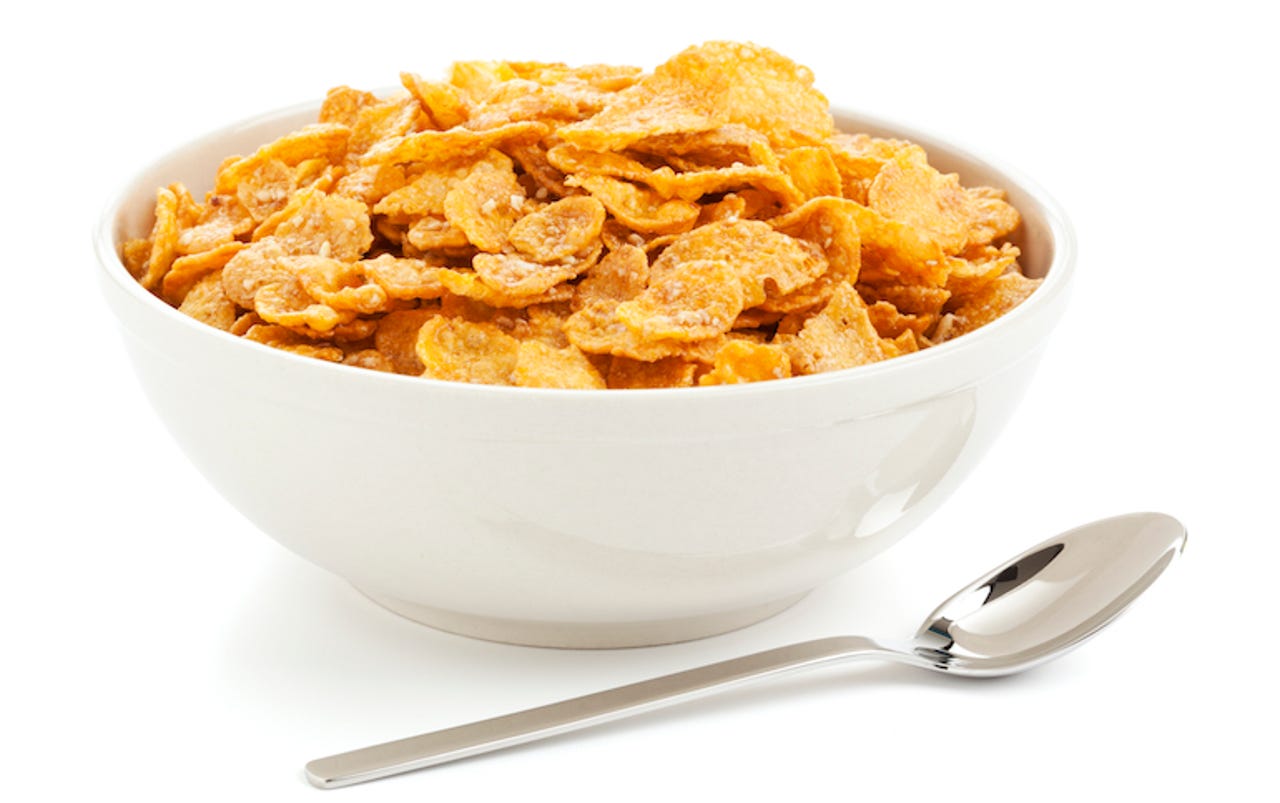Linux and breakfast cereal: Why are there so many flavours?


Is Linux like a bowl of cereal?
Preface: One of the most common complaints about Linux is that there are too many different versions, it is too confusing and difficult to know which version to use, or that the market or users in general would somehow be better served if there were less selection.
My response to this is... well, my real response is not fit to publish here, but perhaps I can make it clear by giving an example based on another real-world choice that most people have to make in everyday life. So here we go.
I am so tired of hearing all the whinging (for Americans: whining) about how there are 'just too many different breakfast cereals', or how 'If the breakfast cereal producers would just concentrate their efforts on one or two good products, they would have much better success".
I mean, how the heck is that supposed to work? By getting rid of established products, reducing selection, and making considerably less effort to please a variety of tastes, they are going to become more successful? That doesn't sound like much of a business plan to me.
Let's consider the range of products we are talking about. There are the very basic ones, like simple Corn Flakes. Nothing fancy, nothing added, no sugar-coating, no extra bits of fruit. These are available in name-brand, store-brand and even no-name generic versions. Does that bother anyone? Is anyone working themselves into a frenzy because they don't know how to decide between these? I don't think so.
Let's get more concrete. I live in Switzerland, where one of the largest online shops is Le Shop, run by Migros. I just went there and entered "Corn Flakes" in the search box. It returned with 119 matching products. Disturbing? No. What would I do if I were actually shopping at this point? I would probably choose something based on my past experience with this product, or similar products. If I had no relevant experience, I would examine some of the products listed, checking on specific things that interest or concern me - ingredients, sugar content, additives or whatever. After looking through some number of them I would have a pretty good idea of what was available, and I would pick one to try.
Then what would happen? I would take the chosen product home, and eat it for breakfast the next morning. If I absolutely hated it and couldn't stand the thought of eating another bowl of it, then I might toss it after just a day or two.
But of course, so far I have only considered "simple" Corn Flakes - one kind of breakfast cereal. We don't really get away that easily, do we? There's a lot more to consider, even within the Corn Flakes family - Frosted Flakes, Crunchy Nut... so now, is it panic time? Look them over. See what they have to offer. If all else fails make a blind choice, take it home and try it. If you don't like it, try again.
I could go on, of course, because I have barely scratched the breakfast cereal surface. But I think that you can see that so far, the same basic procedure works every time, no matter how many different versions and variations you have to choose from. But that's certainly not the only way to proceed.
On one of my trips to the U.S. some time ago, my sister-in-law gave me Honey Bunches of Oats for breakfast - it was her favorite cereal. I absolutely loved it. So there is a completely different selection mechanism: I didn't really "choose", I simply tried something based on the recommendation of a friend. But that's still not all, because I just thought of something else: at some point in your shopping you might be offered a free sample of one of these products, either to try right there on the spot or to take home and try at your leisure.
Finally, let's consider the alternative scenario. Let's think about what it would be like if the general outcry to reduce the confusion were heeded, and the breakfast cereal market were reduced to just a few different products. Would everyone be happy then? More to the point, would anyone be happy then?
Or suppose that the supplier decided to make a major change to the recipe, and they discontinued the previous recipe. Lacking a reasonable selection of alternatives, users would be at the mercy of the supplier, and would have to either accept the change, or give up breakfast cereal. Most people would not think this is an acceptable situation.
Now, suppose that rather than trying to decide what to have for breakfast tomorrow morning, you were thinking about what operating system you want to use on your computer. The first thing you should realize is that there are actually a lot fewer different Linux versions than there are of breakfast cereals (or automobiles, or television sets, or almost anything else you might be shopping for).
The second thing you should realize is that this is not even a very fair analogy - because trying almost any commercial product, even a box of breakfast cereal, costs you money. You have to buy the product in order to try it. Trying almost any version of Linux, however, is free. Absolutely no cost, no obligation, no deposit, free.
In fact, going back to my example of getting a free sample to try out, with the widespread availability of Live CD/DVD/USB images, you can try Linux without even disturbing whatever operating system is currently loaded on your computer. You can basically get a free sample of almost any version of Linux, any time you want it, without having to wait for a special offer or promotion.
The recommendation from a friend situation that I mentioned is also a very good approach to choosing a Linux distribution. This could be a real friend or family member who is actually using Linux, and helps you get started with it.
But it could also be some crazy guy who writes a Linux blog, and spends ridiculous amounts of time trying out different distributions and describing the results. If you have an interest in some specific area or application, such as multimedia production/playback, security, embedded systems or whatever, there are lots of descriptions and hands-on tests of the available distributions.
Finally, you have one more major advantage when evaluating, choosing and using a Linux distribution.
Unlike most commercial products, you are likely to have a direct channel to the developers, maintainers and/or experienced users of whatever distribution you choose. In fact, you could make this one of your selection criteria, so that you would know going in that there would be experienced help and advice available, free of charge, if you needed it.
Linux: Breakfast of Champions
To summarize, the very simple point I am trying to make here is that variety and selection are not a problem, they are an advantage! As consumers, we deal with them every day, in nearly every product that we acquire. So why do we hear never-ending complaints about there being too many different Linux distributions? I honestly can't understand it.
Postscript: I initially considered writing this with direct association of specific cereals with specific Linux distributions. However, I soon realized that there is far more variety in cereal than there is in Linux, so I couldn't really keep it up. I still find some of the associations to be fun, though, so here are a few examples - and I would be very happy to hear about any others in the comments.
- Granola - Slackware
- Granola Bars - Zenwalk
- Müsli - openSuSE
- Plain Oatmeal - Fedora
- Instant Oatmeal - Korora
- Rice Chex - Arch Linux
- Wheat Chex - Gentoo Linux
- Honey Nut Chex - Manjaro Linux
- Plain Corn Flakes - Debian GNU/Linux
- Frosted Flakes - Ubuntu (before Unity)
- Fruit Loops - Ubuntu (after Unity)
- Crunchy Nut Corn Flakes - Linux Mint
- Special K - Linux Mint Debian Edition
- Special K Red Berries - Raspbian
Read more about Linux and open source:
- Hands-on with Kali Linux Rolling
- How to customise your Linux desktop: MATE
- How to customise your Linux desktop: Cinnamon
- How to customise your Linux desktop: Xfce
- Hands-On with openSuSE Leap RC1: A walk through of the installer
- Hands-On: KaOS Linux 2015.10
- Thus versus Calamares: Comparing Manjaro 15.09 installers
- Upgrading my Linux-Windows multi-boot system to Windows 10
- Hands-On: Linux UEFI multi-boot, my way
- Hands-On: Linux UEFI multi-boot, part two